- Учителю
- Урок з англійської мови для 6 класу “School life. Subjects”
Урок з англійської мови для 6 класу “School life. Subjects”
Урок з англійської мови для 6 класу
School life. Subjects.
Objectives: to revise lexis on the topic, to improve grammar skills and listening comprehension skills, to develop dialogical speech, to develop pupils' memory, logical thinking, quick reaction,
Equipment: textbooks, cards
Ход урока.
1.Greeting.
Are you ready to answer my questions ? Let's play our game "Questions-
answers".
2. Warming-up.
T: Are you ready to answer my questions ? Let's play our game " Questions- answers". Listen to my questions attentively:
-
What day is it today?
-
What other school-days do you know?
-
What is your favourite school-day? Why?
-
What do you usually do on your school-days?
-
What are your rest- days?
-
What do you like to do on your rest-days?
-
Do you like school-days or rest-days? Why?
Our today's topic is closely connected with school. We'll have a great number of activities and make a wonderful school trip. Our lesson will be conducted in a form of a competition.
Our first station is called " Acquaintance". So let's divide into 2 teams. Your first task is to think of a name and choose the captain.
3. Practice activities.
T: Thanks a lot to the teams for their presentations. It's high time to move
to our main stations.
At our first station we are going to revise school subjects. At first let's repeat the words all together and then we'll have some competitions. Your task is to make up sentences. What do pupils usually do at the following lessons?
Flashcards:
Foreign languages
English
German
Natural History
Spanish
French
Music
Physical Training
Russian
Ukrainian
Russian Literature
Ukrainian Literature
Drawing
Mathematics
History
Botany
Physics
Chemistry
Biology
Geography
P1: We usually read poems, stories, write compositions at Ukrainian Literature
lessons.
P2: We usually sing songs, listen to music and play interesting games at Music lessons.
P3: We usually play volleyball, jump, run and take part in sports competitions at
Physical Training lessons (etc).
The next station is "Crosswords". The task for our teams is to guess the crossword
"Subjects".
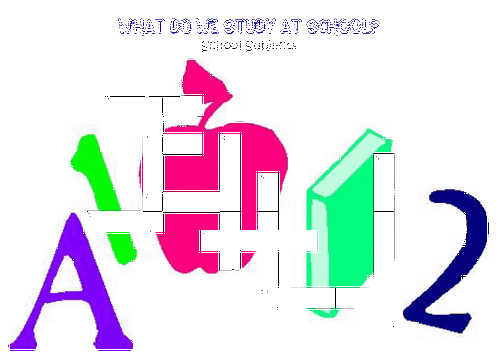
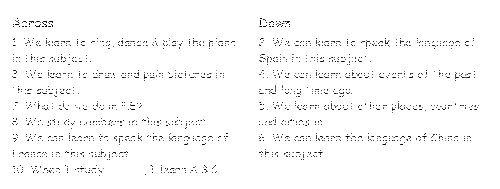
The station "Discussion"
T: And now the task for both teams is to write down one subject they like
and one subject they dislike and explain why.
T: Make up your own dialogues about your favorite subject.
The station " Grammar''
T: And now the task for both captains is to make up at least 7 questions to the
following sentences:
-
Team 1
-
Bill gets up at 7 o'clock.
-
He goes to school at half
past seven.
-
He likes Physical
Training very much.
-
He likes to play football
and basketball with his class-
mates at this lesson.
5) Bill comes home from school at 1 o'clock.
6) After school Bill usually
plays computer games.
7) Bill is very lazy.
Team 2
-
Ann gets up at 7 o'clock too.
-
She likes to go to school.
3) Her lessons begin at 8 o'clock.
-
She likes French and Maths.
-
Ann likes to play French
games at the lesson.
-
She speaks French very well.
-
Ann can do sums vey well too.
-
After school Ann usually
helps her mother about the house.
She is hard-working.
-
The teams answer the questions of their captains. They get one point for
each right answer.
T: Let's revise the English humorous poem " In the evening":
In the evening - No, I'm not.
In the evening I'm not dancing,
My telephone is ringing I'm not reading,
And my friends are asking me, I'm not eating,
" Are you watching TV? I'm not sleeping,
Are you dancing? I'm learning English.
Are you eating?
Are you sleeping?"
T: What tense is it used in this poem?
P1: Present Continuous
T: Look at the pictures and make up your sentences in Present Continuous.
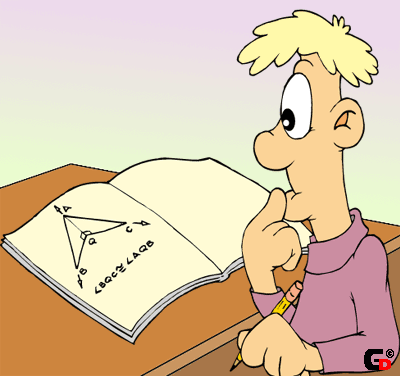
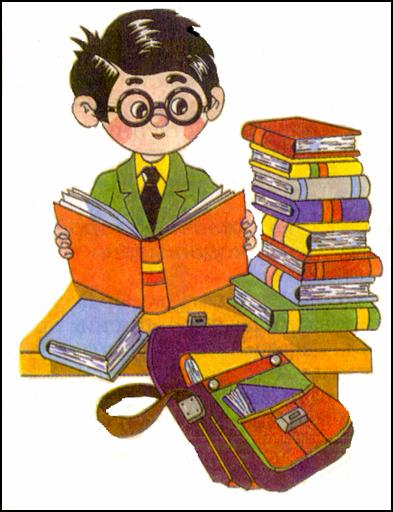
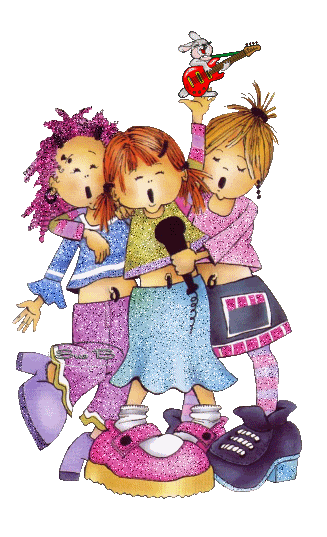
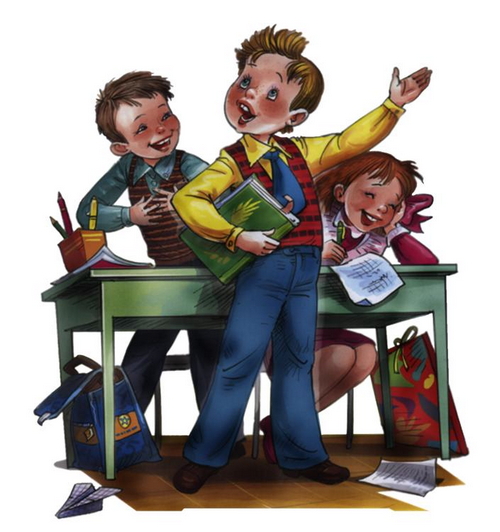
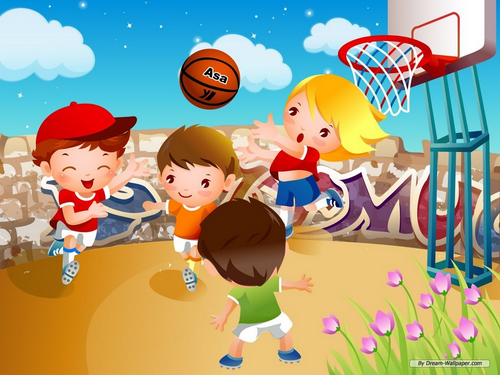
P1: This schoolboy is doing sums at the present moment.
P2: The schoolchildren are playing basketball in the yard now/ (etc)
The station "Listening"
T: Now we are going to listen to the dialogue " Our school life".
Be ready to fill in the table 1. You'll say to me what Adam and Sophie
do every day.
Dialogue.
-
Hello, Sophie! Are you a new girlfriend from France?
-
Yes, I am. And this is my brother, Adam.
-
Hi! I'm Harry.
-
Hi!
-
Can I ask you some questions for the school magazine?
-
Yes, sure.
-
Do you like Great Bitain?
-
Yes, we do. We have a great time here. On Saturdays and
Sundays we roller blade in the park. Every Friday we go to the cinema.
-
Do you like football?
-
Yes, we do. Sophie and I are great football players. We play
football with friends every day.
-
And we like basketball. We play basketball on Tuesdays and Thursdays.
-
And do you like school here ?
-
Yes we do. We've got great friends at school. But they've got a lot of homework. We do homework every day.
-
Post-listening activity.
Pupils fill in the table:
-
to roller
blade
to play
football
to go to the
cinema
to play
basketball
Monday
Yes
Tuesday
Yes
Yes
Wednesday
Yes
Thursday
Yes
Yes
Friday
Yes
Yes
Saturday
Yes
Yes
Sunday
Yes
Yes
P1: Adam and Sophie roller blade on Saturday and Sunday.
P2: They like to play football every day.
P3: They go to the cinema on Friday.
P4: Adam and Sophie like to play basketball on Tuesday and Thursday.
T: How often do they do their homework?
P5: They do homework every day.
T: What about you? Do you do homework every day?…
4. Summing-up.
T: What account do we have now? My congratulations. But I think that friendship has won. Do you agree with me?
5. Homework assignment.
T: We've spoken much about your favourite subjects, school life, so your
task will be write down and be ready to present a composition " My school life".
The English party " Funny Grammar . The world around us"
Objectives:
- to practise communicative skills in pair and group work,
- to revise pupils' vocabulary on the topic "Animals" through games,
- to develop pupils' reading, listening skills,
Equipment: cards, pictures, tables, a tape recorder
Procedure
1. Greeting.
2. Warming-up.
T: Good morning! I'm glad to see you. We meet together to play English
games. I hope you'll enjoy our English party. Today we are going to speak about animals which live around us. By the way, what animals do you know? You know a lot of animals and perhaps you keep them at home as pets. Will you tell us about them? How do you take care of them?
3. The main part.
T: Dear judges! Please, listen attentively! We've got two teams in our
competition. If the team says the right answer, it will take one point. We
have got some cards on the table. Please, captains, take the card with the
task.
Card 1.
Complete the text with the verbs in Present Indefinite.
a) Elephants ______( to live ) in Africa and India. They ____ (to be)
three to four metres tall. A big elephant _______ ( to weigh) about six
thousand kilos. The babies ______( to leave ) their mothers when they _
(to be) fifteen years old. Any elephant ____( to swim ) very well.
Elephants ____( to be ) very good swimmers, indeed.
-
Koalas can______(to swim) very well too. They_____( not live)
in Africa or India. Koalas _____( to live) in Australia.They___( to live)
and_______(to sleep) in the trees. Any koala _____(to climb) very well.
Koalas _____( to live) for about fifteen years.
T: The next task is for all members of our teams. Your task is to ask
questions about animals, using the following words:
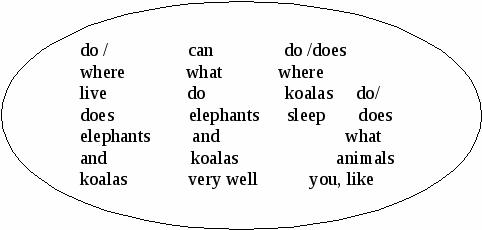




T: The captains will answer those questions which are built up by you
correctly. Be attentive!
P1: Where do elephants and koalas live?
P2: What can elephants and koalas do very well?
P3: Where do koalas sleep?
P4: What animals do you like? Why?
Card 2.
Comment on this slogan: "Don't buy presents or toys made from rare animals".
T: Many animals are in danger because people hunt them.
For example, people kill elephants to sell their tusks.
They make presents and ornaments from them. What
can we do to help animals?
( Discussion).
Card 3 .
Find some mistakes.
-
Red squirrels is now very rare in Britain.
-
There is two species of deer in Britain.
-
Golden eagles lives in the mountains of Wales and Scotland.
-
Pumas has got long legs and can jump 10 metres.
-
Now pumas are very rare in many area of America.
-
Foxs are common and you can sometimes see them in gardens
in Bitain's big citys.
Card 4.
Choose the correct word to complete the description.
We've got two cats and a dog at home. My/ Me mum and dad love
their/ them. My favourite is the dog - Cleopatra. I take her/she out in the
evenings. The cats sleep /sleeps in my bedroom and they / them go out at night.
Cleopatra don't like/ doesn't like they/them! In the garden, we've got a
rabbit. We like play/like to play with our pets.
Card 5.
Tell us about your favourite pet.
Card 6.
The next station is " Riddles".
Try to guess the riddles and make up your sentences in Present Simple.
«My colour is white. I can jump. I can't run. What am I?» Try to guess! You are right! This is a hare. My second riddle «I am grey. I can run, jump. I can wash myself. I can't fly. I like milk. What am I?» You are right! This is a cat.
And the last riddle. «I'm yellow and black.I can run, jump, walk.I'm from Africa. I'm not funny. I'm strong and dangerous. What am I?» Who can guess? You are right again! This is a tiger.Who can make up sentences fast
Сard 7.
Translate the proverbs about animals and give Russian equivalents
1. To kill two birds with one stone.
1. Кто рано встает, того удача ждет.
2. A bird in the hand is worth two in the bush.
2. Убить двух зайцев.
3. Every dog has his day.
3. Не сули журавля в небе, а дай синицу в руки
4. The early bird catches the worm.
4. Будет и на вашей улице праздник.
5. No bees, no honey.
5. Любопытной Варваре на базаре нос оторвали
6. Curiosity killed a cat.
6. Без труда, не выловишь рыбку из пруда.
Card 8.
Start each sentence with a suitable creature:
1. …… can fly a great height 2. …… can swim very long distance.
3. …… can eat fruit from tall trees. 4. …… can understand lots of human commands.
5. … can run very fast. 6… can travel through the desert for long distance without water.
7. …… can change their skin several times a year. 8. …… can provide us with wool.
9. …… can be 30 metres in length.
Card 9
Do you know the poems and songs about animals?
(The children sing songs and declaim poems about animals)
Card 10
Give the plural forms of the nouns:
Snake -
Mouse -
Eagle -
Goose -
Monkey -
Elephant -
Fish -
Wolf -
Shark -
4. Summing-up.
T: What account do we have now? My congratulations. But I think that friendship has won. Do you agree with me?